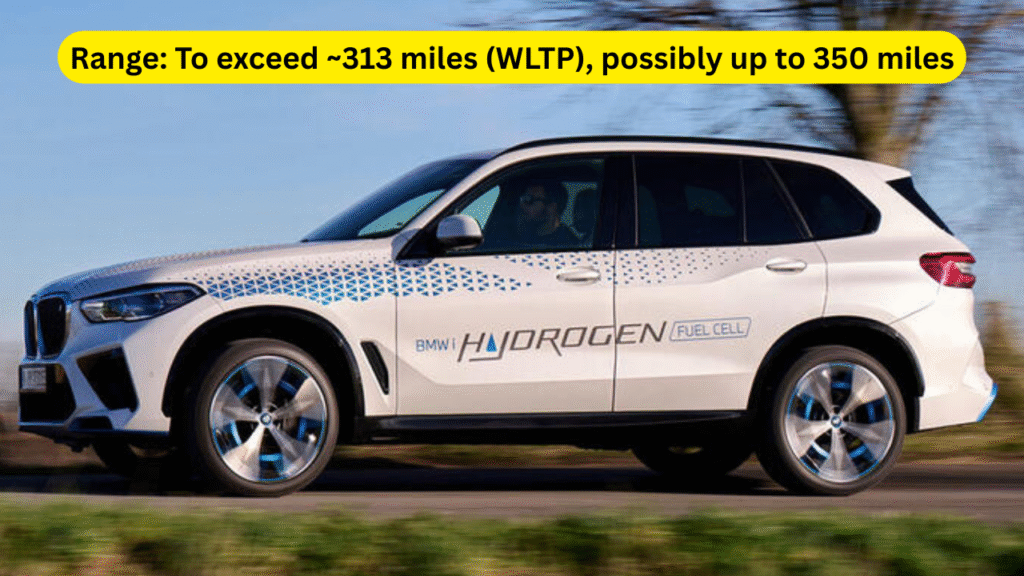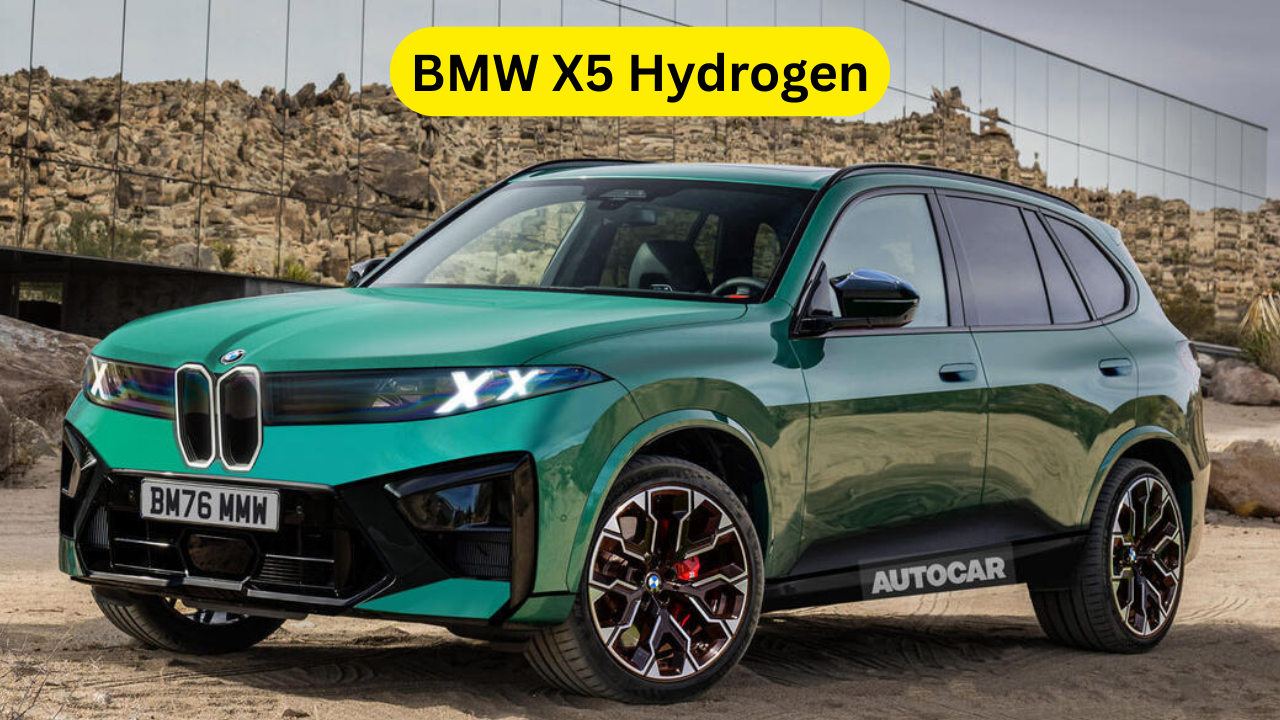BMW X5 Hydrogen: BMW has officially confirmed that its fifth-generation X5, due in 2028, will include a hydrogen fuel cell electric vehicle (FCEV) variant — marking a major milestone in the German automaker’s electrification strategy. Building on the learnings from the experimental iX5 Hydrogen fleet that has been in testing since 2023, the upcoming production model will be BMW’s first-ever hydrogen-powered car for commercial sale. This bold step underscores BMW’s commitment to diversifying its powertrain lineup and reducing dependence on conventional fossil fuels.
The move comes at a time when the global auto industry is exploring alternatives beyond pure battery-electric vehicles (BEVs). While BEVs dominate discussions around green mobility, hydrogen technology has long been viewed as a potential game-changer due to its fast refueling times, long driving range, and minimal environmental impact. By introducing the hydrogen-powered X5, BMW is positioning itself at the forefront of this emerging market, targeting regions with developing hydrogen infrastructure such as parts of Europe, Japan, South Korea, and select areas of North America.
In addition to its cutting-edge powertrain, the 2028 BMW X5 (G65 generation) will introduce a fresh design language and revolutionary interior technology. Inspired by the upcoming second-generation iX3 based on BMW’s Neue Klasse platform, the X5 will feature futuristic styling, a panoramic display system, and an updated infotainment interface with a massive 17.9-inch central screen. This combination of innovation in both sustainability and luxury technology ensures that the new X5 won’t just be another premium SUV, but a pioneer that redefines the future of mobility.
BMW X5 Hydrogen Fuel Cell Specifications
| Feature | Details |
|---|---|
| Model | 2028 BMW X5 (G65 Generation) Hydrogen FCEV |
| Powertrain | Third-generation BMW-Toyota co-developed hydrogen fuel cell system |
| Fuel Cell Output | Improved over iX5 Hydrogen (187bhp stack + 295bhp motor = 396bhp system output) |
| Expected Power | 400+ bhp (combined system) |
| Range | To exceed ~313 miles (WLTP), possibly up to 350 miles |
| Hydrogen Tanks | Two 700-bar tanks with ~6kg hydrogen capacity |
| Charging/Refueling | Hydrogen refill time ~3-5 minutes |
| Chassis/Platform | Fifth-generation X5, influenced by Neue Klasse design |
| Interior | Panoramic projected display, 17.9-inch central screen, no iDrive controller |
| Connectivity | Next-gen BMW OS, 5G, AI-powered voice commands |
| Safety | Advanced driver-assist features, Level 2+ autonomy expected |
| Launch | 2028 |
| Markets | Select countries with hydrogen refueling infrastructure |
| Price (Expected) | Likely $80,000+ / €75,000+ (premium positioning) |
Features and Highlights
1. Hydrogen Fuel Cell System
BMW is moving to its third-generation hydrogen powertrain, co-developed with Toyota. Unlike traditional EVs that rely solely on batteries, the X5 FCEV uses hydrogen stored in high-pressure tanks, which reacts in the fuel cell stack to generate electricity. This electricity powers the motors directly while also charging a buffer battery. The setup ensures zero CO₂ emissions, a longer range, and fast refueling times compared to BEVs.
2. Performance & Efficiency
The experimental iX5 Hydrogen produced 396bhp with smooth power delivery and a WLTP range of around 313 miles. The 2028 production version is expected to surpass this, possibly offering 400+ horsepower and improved efficiency thanks to modular and scalable technology. This positions the hydrogen X5 as a true performance-luxury SUV without compromise.
3. Exterior Design
The G65-generation BMW X5 will borrow design cues from the Neue Klasse lineup. Expect a sharper front fascia, slimmer LED headlights, aerodynamic efficiency improvements, and a redefined SUV silhouette. The design will not only modernize the X5 but also emphasize sustainability with lightweight materials and advanced aerodynamics.
4. Interior & Technology
The cabin will be radically different. BMW is expected to drop the traditional iDrive rotary controller, shifting completely to touch and voice-based controls. A panoramic projection display will replace conventional instrument clusters, while the centerpiece will be a 17.9-inch wide infotainment screen. AI-driven smart assistants and advanced connectivity features will enhance both convenience and luxury.
5. Range & Refueling
Hydrogen FCEVs hold a clear advantage in refueling time. Unlike BEVs that require anywhere from 30 minutes to several hours to recharge, the new X5 can refuel in just 3-5 minutes. With an expected range of 350 miles, it becomes an attractive option for long-distance drivers.

Price and Launch Timeline
BMW has confirmed that the hydrogen-powered X5 will debut in 2028. Sales will begin in select global markets with reliable hydrogen fueling infrastructure. These may include Germany, Japan, South Korea, and certain U.S. states like California.
The pricing is expected to place the vehicle in the premium SUV bracket, likely starting above $80,000 (₹70 lakh+ in India if introduced, though unlikely at first). Given the pioneering technology, exclusivity, and high development costs, the hydrogen X5 will be positioned as a flagship eco-luxury SUV.
Also read: Kia EV5 Review 2025 – Price, Range, Specs, Features & Rivals
Unique Selling Points (USPs)
- Hydrogen fuel cell technology offering zero emissions, long range, and quick refueling.
- Third-generation fuel cell system co-developed with Toyota for greater efficiency and modular scalability.
- Bold new design language, inspired by Neue Klasse aesthetics.
- Revolutionary interior tech with panoramic projection and large-format infotainment.
- Premium performance SUV with over 400bhp power output.
Conclusion
The 2028 BMW X5 hydrogen fuel cell variant is not just another addition to BMW’s powertrain lineup — it represents a revolution in sustainable luxury mobility. While the world continues debating the dominance of battery-electric cars, BMW’s move to commercialize hydrogen FCEVs signals its confidence in hydrogen as a viable long-term solution.
By combining sustainability, high performance, and luxury, BMW aims to carve a niche for itself in an emerging market. The X5 hydrogen model offers the practicality of quick refueling and long range without sacrificing the driving pleasure that BMW is known for. This gives it a unique edge over pure BEVs, which still struggle with charging infrastructure and long recharge times.
The upcoming G65-generation X5 also showcases BMW’s bold shift in design and interior technology. From futuristic display systems to touch and voice controls, it marks the beginning of a new era for the brand. Customers can expect a seamless blend of premium comfort, cutting-edge connectivity, and eco-friendly driving.
Ultimately, the hydrogen-powered X5 will be more than just a luxury SUV — it will be a symbol of BMW’s commitment to innovation, sustainability, and customer choice. For those living in markets with robust hydrogen infrastructure, it could very well be the most exciting and future-ready SUV of its time.
Frequently Asked Questions
1. How is the BMW X5 Hydrogen different from an electric X5?
While both are emission-free, the hydrogen X5 uses a fuel cell system that generates electricity from hydrogen on-board, while the electric X5 relies solely on a rechargeable battery pack. The main difference lies in refueling vs. recharging — hydrogen refuels in minutes, whereas BEVs require longer charging times.
2. What is the range of the hydrogen-powered BMW X5?
The pilot iX5 Hydrogen had a WLTP range of about 313 miles. The production 2028 model is expected to exceed 350 miles, making it highly competitive with both EVs and combustion SUVs in terms of long-distance capability.
3. How fast can the hydrogen X5 refuel?
One of the biggest advantages of hydrogen fuel cell cars is refueling speed. The BMW X5 Hydrogen can be refilled in 3–5 minutes, similar to a petrol or diesel car, offering convenience that most battery-electric vehicles cannot match.
4. Will the BMW X5 Hydrogen be available globally?
No. Sales will be limited to regions with hydrogen refueling infrastructure, such as Germany, Japan, South Korea, and California. BMW plans selective rollout to ensure practicality for customers, with global expansion dependent on infrastructure growth.
5. How much will the hydrogen-powered BMW X5 cost?
While exact pricing has not been confirmed, experts estimate it will start above $80,000 (€75,000 / ₹70 lakh+). Being a premium, pioneering technology SUV, it will likely sit at the higher end of BMW’s pricing spectrum.


2 thoughts on “Next BMW X5 to Add Hydrogen Fuel Cell Power in 2028”